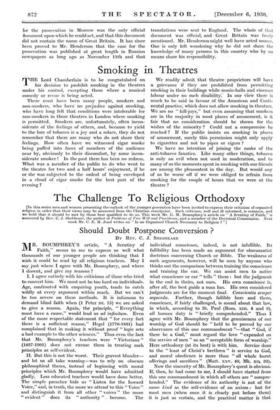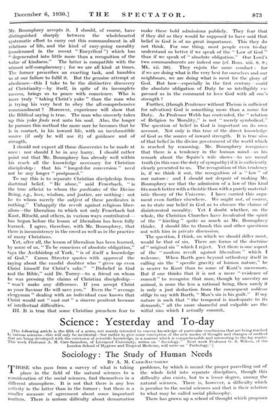The Challenge To Religious Orthodoxy
[In this series men and women presenting the outlook of the younger generation have been invited to express their criticism of organized religion in order that their views may be answered from the Christian standpoint. Such criticism, well and ill informed, is common, and we hold that it should be met by those beat qualified to do so. This week Mr. G. M. Boumphrey's article on " A Scrutiny of Faith," is answered by Rev. C. J. Shebbeare, the author of Problems of Free Will and Providence, and a member of the Doctrinal Commission. Next
week Mr. C. E. M. Joad writes on " Is an Organized Church Necessary to Religion ? ")
Should Doubt Postpone Conversion ?
BY REV. C. J. SHEBBEARE MR. BOUMPHREY'S article, " A Scrutiny of Faith," seems to me to express so well what thousands of our younger people are thinking that I wish it could be read by all religious teachers. May I say just where I agree with Mr. Boumphrey, and where I dissent, and give my reasons ?
I. I agree entirely with his criticisms of those who tried to convert him. We must not be too hard on individuals. Age, confronted with enquiring youth, tends to catch wildly at every argument within reach. But we can't be too severe on these methods. It is infamous to demand blind faith when (1 Peter nr. 15) we are asked to give a reason. Again, the principle, " Everything must have a cause," would lead us ad infinitum. Even of the more respectable statement that " for every fact there is a sufficient reason," Hegel (1770-1881) had complained that in making it without proof " logic sets a bad example to the other sciences." Thus even the fact that Mr. Boumphrey's teachers were " Victorians " (1837-1901) does not excuse them in treating such principles as self-evident.
II. But this is not the worst. Their gravest blunder— and let us all take warning—was to rely on obscure philosophical theses, instead of beginning with moral principles which Mr. Boumphrey would have admitted gladly. Less educated teachers would have done better. The simple preacher bids us " Listen for the Inward Voice," and, in truth, the more we attend to this " Voice " and distinguish it from all other " voices " the more " evident " does its " authority " 'become. The
individual conscience, indeed, is not infallible. Its fallibility has been made an argument for obscurantist doctrines concerning Church or Bible. The weakness of such arguments, however, will be seen by anyone who thinks out the comparison between training the conscience and training the ear. We can assist men to notice what conscience or ear " tells " them : but the judgment in the end in theirs, not ours. His own conscience is, after all, the best guide a man has. His own considered judgments are for the moment final. Conscientia serapes sequenda. Further, though fallible here and there, conscience, if fairly challenged, is sound about that law, in which, according to St. Paul (Rom. xn.t. 8 and 9), all human duty is " briefly comprehended." Thus I agree with Mr. Boumphrey that the genuineness of our worship of God should be " held to be proved by our observance of this one commandment "—that " God, if there be a God," must regard the love "expended on ' the service of men " as an " acceptable form of worship." Here orthodoxy (at its best) is with him. Service done to the " least of Christ's brethren " is service to God, and moral obedience is more than " all whole burnt offerings and sacrifices " (Matt. xxv. 40, Mk. xi; 33); Now the sincerity of Mr. Boumphrey's quest is obvious. If, then, he had come to me, I should have started from this one commandment in which all others are " compre- hended." The evidence of its authority is not of. the same kind as the self-evidence of an axiom : but for most men (when once it is clearly put before them) it is just as certain, and the practical matter is that
Mr. Boumphrey accepts it. I should, of course, have distinguished sharply between the wholehearted systematic effort to carry out this commandment in all relations of life, and the kind of easy-going morality (condemned in the recent " Encyclical ") which has "degenerated into little more than a recognition of the value of kindness." The latter is compatible with the utmost self-complacency ; for we are all kind at times. The former prescribes an exacting task, and humbles us at our failure to fulfil it. But the genuine attempt at obedience—this I take to be the distinctive discovery of Christianity—by itself, in spite of its incomplete success, brings us to peace with conscience. Who is more truly " taking Christ's yoke " than the man who is trying his very best to obey the all-comprehensive commandment ? Moreover, experience will show that the Biblical saying is true. The man who sincerely takes up this yoke finds rest unto his soul. Also, the longer he pursues this method the more sure he becomes that he is in contact, in his inward life, with an inexhaustible source (if only he will use it) of guidance and of strength.
I should not expect all those discoveries to be made at once : or should I be in any hurry. I should rather point out that Mr. Boumphrey has already well within his reach all the knowledge necessary for Christian discipleship : that his " longed-for conversion " need not be any longer " postponed."
To say this is to separate Christian discipleship from doctrinal belief. " He alone," said Feuerbach, " is the true atheist to whom the predicates of the Divine Being, e.g., love, wisdom, and justice, are nothing : not he to whom merely the subject of these predicates is nothing." Unhappily the revolt against religious liber- alism—the liberalism to which not only Feuerbach but Kant, Ritschl, and others, in various ways contributed— has begun before the lesson of liberalism has been fully learned. I agree, therefore, with Mr. Boumphrey, that there is inconsistency in the creed as well as in the practice of many Christians.
Yet, after all, the lesson of liberalism has been learned, by some of us. " To be conscious of absolute obligation," says the Archbishop of York, " is of itself a knowledge of God." Canon Streeter quotes with approval the saying about the candid doubter who " gives up even Christ himself for Christ's sake." " Disbelief in God and the Bible," said Dr. Torrey—to a friend on whom he was pressing the claims of Christian discipleship- " won't make any difference. If you accept Christ as your Saviour He will save you." Even the " average clergyman " dealing with an individual case knows that Christ would not " cast out " a sincere penitent because of intellectual difficulties.
III. It is true that some Christian preachers fear to make these bold admissions publicly. They fear that if they did so they would be supposed to have said that belief in God is of no great importance. This they do not think. For one thing, most people even to-day understand us better if we speak of the " Law of God " than if we speak of " absolute obligation." Our Lord's two commandments are indeed one (cf. Rom. xiii. 8, 9 ; Mk. xii. 30). They enjoin the same conduct : for if we are doing what is the very best for ourselves and our neighbours, we are doing what is most for the glory of God. But how—especially in the first century—could the absolute obligation of Duty be so intelligibly ex- pressed as in the command to love God with all one's strength ?
Further, (though Penitence without Theism is sufficient for salvation) God is something more than a name for Duty. As Professor Webb has contended, the " relation of Religion to Morality," is not " merely symbolical." The question of belief in God is important on its own account. Not only is this true of the direct knowledge of God as the source of inward strength. It is true also of that belief in the divine government of the world which is reached by reasoning. Mr. Boumphrey recognizes that there is a tendency in the human mind—us his remark about the Squire's wife shows—to see moral truth (in this case the duty of sympathy) if it is sufficiently clearly presented to us. The recognition of this tendency is, if we think it out, the recognition of a " law " of our nature : and I should not despair of making Mr. Boumphrey sec that the admission of a law of this kind fits much better with a theistic than with a purely material- istic theory of the Universe. I have carried this argu- ment even further elsewhere. We ought not, of course, so to state our belief in God as to obscure the claims of disinterested morality. Yet I doubt whether, on the whole, the Christian Churches have inculcated the spirit of the " hireling " quite as much as Mr. Boumphrey thinks. I should like to thrash this and other questions out with him in private discussion.
The question, I think, on which we should differ most, would be that of sin. There are forms of the doctrine of " original sin " which I reject. Yet there is one aspect of the " modern revolt against liberalism " which I welcome. When Barth goes beyond orthodoxy itself in calling sin the " specific gravity of human nature," he is nearer to Kant than to some of Kant's successors. But if one thinks that it is not a mere " evidence of conceit" to recognize that man, though by ancestry an animal, is none the less a rational being, then surely it is only a just deduction from the consequent noblesse oblige to say with Barth, " Man's sin is his guilt." If my nature is such that " the temporal is inadequate to its demands," all the more shameful and culpable arc the wilful sins which I actually commit.



























































 Previous page
Previous page